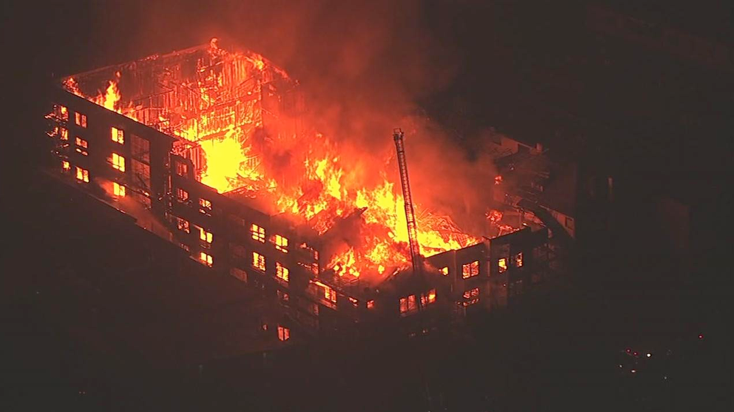Comments‘NO ONE SHOULD DIE THIS WAY’-The deadly warehouse fire in Oakland, California that claimed the lives of at least 36 people at a Friday night dance party was a symptom of the Bay Area's massive housing crisis, artists and advocates are saying.
The Fruitvale-area warehouse, known as Ghost Ship, was a live-work space that supported underground artists and provided makeshift residences for people priced out of rapidly gentrifying Bay Area cities. It lacked basic fire safety mechanisms, which came into play on Friday as the blaze broke out at the electronic music party and engulfed the building, blocking the main escape path—a rickety staircase—and quickly becoming what may be the deadliest structural fire in Oakland's history.
As cadaver searches continue on the property, tenants' rights activists and Bay Area residents say the tragedy happened because of a lack of access to affordable housing fueled in large part by the technology boom that has transformed San Francisco into one of the most expensive cities in the world. They say housing policies have continually failed to protect marginalized communities and force low-income people to take up increasingly unsafe residences.
Ghost Ship housed some two dozen people who lived together as an artist collective. According to officials, the death toll is expected to rise. Local PBS affiliate KQED compiled a list of ways people can support relief efforts.
"No one should die this way. No one should have to live without proper fire safety measures in their home just to try to make ends meet, just to try to make art, just to be in the city," the Oakland-based tenants' rights organization Causa Justa (Just Cause) wrote on Facebook on Saturday. "Black and Latino working class Oaklanders are pushing for habitability and affordability solutions for our city, for this very reason."
"If you can't afford to buy a million-dollar home, then you can't afford to live in this city unless you're willing to risk your safety. And that's unconscionable," Causa Justa director María Poblet told the Guardian.
Gabe Meline, online arts editor for KQED, wrote in an op-ed on Sunday titled "It Could Have Been Any One of Us" that the warehouse spaces sought out by these communities "are what have kept us alive."
"For the tormented queer, the bullied punk, the beaten trans, the spat-upon white trash, the disenfranchised immigrants, and young people of color, these spaces are a haven of understanding in a world that doesn't understand—or can't, or doesn't seem to want to try," he wrote, continuing:
They don't understand why we don't just live in a $3,000/mo. apartment where everything is safe and sterile and clean; why we live in a warehouse, or a garage, or an attic or shed or laundry room; why there is a mattress on the floor with a space heater where there normally would be a Queen size bed with a duvet and a nightstand and central heating.
[....] They don't understand that we do not fit into the boxes the world tries to sell us. That their world is unacceptable, and that even for all the ragged edges, we need our own world on our own terms.
Nihar Bhatt, a DJ and record label owner who survived the fire, told the Guardian, "Warehouse parties have been a central part of Oakland for decades. There's a movement in Oakland of experimental black and brown and queer people who don't necessarily want to be in a bar or a club."
Many of the underground venues that provide space for these communities operate without license in buildings that are not up to code. Yet when tenants do raise concerns about unsafe conditions, they may find themselves simply being evicted by city managers who deem the buildings too dangerous to live in, as happened earlier this year with another Oakland warehouse.
Such an eviction often allows real estate developers to buy up the property and transform it into luxury housing or other profitable venue.
As Oakland musician Tarik Kazaleh told the Guardian, "That's a slumlord landlord's best-case scenario. They'll just get a tech firm and get more money."
Jonah Strauss, a record engineer, added, "Lack of affordable living spaces is the single greatest threat to Oakland arts and music."
Musician Kimya Dawson wrote on Facebook, "It's hard to find words. I have played in so many spaces with precarious floors and beams and stairs and not enough exits and certainly no sprinklers. Warehouses, squats, basements, rooftops, barns. Playing music saves my life. People tell me listening to music saves their lives. People telling me that my music saved their life saves my life even more. And we take the risks. Playing and listening in unsafe spaces. Because when we feel like we are dying anyway the risks don't seem as risky as the risks we already face every day."
Oakland District Attorney Nancy O'Malley on Sunday announced she had opened a criminal probe into the fire. As always seems to be the case, it comes too late to matter to 30-plus lives.
(Nadia Prupis writes for Common Dreams … where this piece was first posted.)
-cw
Sidebar
Our mission is to promote and facilitate civic engagement and neighborhood empowerment, and to hold area government and its politicians accountable.

 CityWatch Los Angeles
Politics. Perspective. Participation.
CityWatch Los Angeles
Politics. Perspective. Participation.
17
Wed, Dec















